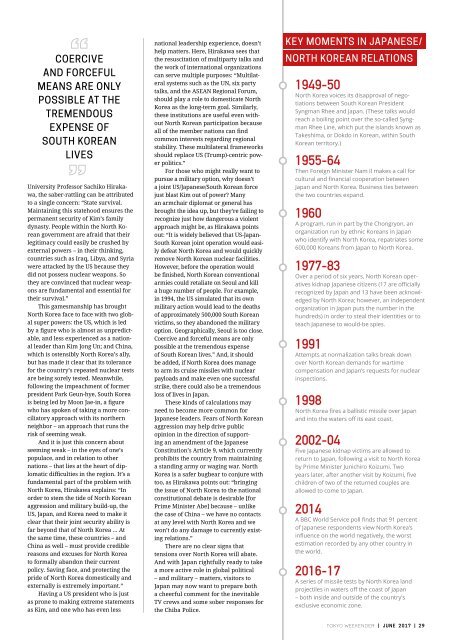Tokyo Weekender - June 2017
Tokyo’s old soul is alive and well. This month, we discover its essence in a retro shotengai, explore its renaissance in modern Japan, and find it in everyday moments on the city streets. Plus: Japan's Archaic Sex Crime Laws Are Finally Changing, Secret Gardens in Tokyo, and Is North Korea a Real Threat?
Tokyo’s old soul is alive and well. This month, we discover its essence in a retro shotengai, explore its renaissance in modern Japan, and find it in everyday moments on the city streets. Plus: Japan's Archaic Sex Crime Laws Are Finally Changing, Secret Gardens in Tokyo, and Is North Korea a Real Threat?
You also want an ePaper? Increase the reach of your titles
YUMPU automatically turns print PDFs into web optimized ePapers that Google loves.
COERCIVE<br />
AND FORCEFUL<br />
MEANS ARE ONLY<br />
POSSIBLE AT THE<br />
TREMENDOUS<br />
EXPENSE OF<br />
SOUTH KOREAN<br />
LIVES<br />
University Professor Sachiko Hirakawa,<br />
the saber-rattling can be attributed<br />
to a single concern: “State survival.<br />
Maintaining this statehood ensures the<br />
permanent security of Kim’s family<br />
dynasty. People within the North Korean<br />
government are afraid that their<br />
legitimacy could easily be crushed by<br />
external powers – in their thinking,<br />
countries such as Iraq, Libya, and Syria<br />
were attacked by the US because they<br />
did not possess nuclear weapons. So<br />
they are convinced that nuclear weapons<br />
are fundamental and essential for<br />
their survival.”<br />
This gamesmanship has brought<br />
North Korea face to face with two global<br />
super powers: the US, which is led<br />
by a figure who is almost as unpredictable,<br />
and less experienced as a national<br />
leader than Kim Jong Un; and China,<br />
which is ostensibly North Korea’s ally,<br />
but has made it clear that its tolerance<br />
for the country’s repeated nuclear tests<br />
are being sorely tested. Meanwhile,<br />
following the impeachment of former<br />
president Park Geun-hye, South Korea<br />
is being led by Moon Jae-in, a figure<br />
who has spoken of taking a more conciliatory<br />
approach with its northern<br />
neighbor – an approach that runs the<br />
risk of seeming weak.<br />
And it is just this concern about<br />
seeming weak – in the eyes of one’s<br />
populace, and in relation to other<br />
nations – that lies at the heart of diplomatic<br />
difficulties in the region. It’s a<br />
fundamental part of the problem with<br />
North Korea, Hirakawa explains: “In<br />
order to stem the tide of North Korean<br />
aggression and military build-up, the<br />
US, Japan, and Korea need to make it<br />
clear that their joint security ability is<br />
far beyond that of North Korea … At<br />
the same time, these countries – and<br />
China as well – must provide credible<br />
reasons and excuses for North Korea<br />
to formally abandon their current<br />
policy. Saving face, and protecting the<br />
pride of North Korea domestically and<br />
externally is extremely important.”<br />
Having a US president who is just<br />
as prone to making extreme statements<br />
as Kim, and one who has even less<br />
national leadership experience, doesn’t<br />
help matters. Here, Hirakawa sees that<br />
the resuscitation of multiparty talks and<br />
the work of international organizations<br />
can serve multiple purposes: “Multilateral<br />
systems such as the UN, six party<br />
talks, and the ASEAN Regional Forum,<br />
should play a role to domesticate North<br />
Korea as the long-term goal. Similarly,<br />
these institutions are useful even without<br />
North Korean participation because<br />
all of the member nations can find<br />
common interests regarding regional<br />
stability. These multilateral frameworks<br />
should replace US (Trump)-centric power<br />
politics.”<br />
For those who might really want to<br />
pursue a military option, why doesn’t<br />
a joint US/Japanese/South Korean force<br />
just blast Kim out of power? Many<br />
an armchair diplomat or general has<br />
brought the idea up, but they’re failing to<br />
recognize just how dangerous a violent<br />
approach might be, as Hirakawa points<br />
out: “It is widely believed that US-Japan-<br />
South Korean joint operation would easily<br />
defeat North Korea and would quickly<br />
remove North Korean nuclear facilities.<br />
However, before the operation would<br />
be finished, North Korean conventional<br />
armies could retaliate on Seoul and kill<br />
a huge number of people. For example,<br />
in 1994, the US simulated that its own<br />
military action would lead to the deaths<br />
of approximately 500,000 South Korean<br />
victims, so they abandoned the military<br />
option. Geographically, Seoul is too close.<br />
Coercive and forceful means are only<br />
possible at the tremendous expense<br />
of South Korean lives.” And, it should<br />
be added, if North Korea does manage<br />
to arm its cruise missiles with nuclear<br />
payloads and make even one successful<br />
strike, there could also be a tremendous<br />
loss of lives in Japan.<br />
These kinds of calculations may<br />
need to become more common for<br />
Japanese leaders. Fears of North Korean<br />
aggression may help drive public<br />
opinion in the direction of supporting<br />
an amendment of the Japanese<br />
Constitution’s Article 9, which currently<br />
prohibits the country from maintaining<br />
a standing army or waging war. North<br />
Korea is a safer bugbear to conjure with<br />
too, as Hirakawa points out: “bringing<br />
the issue of North Korea to the national<br />
constitutional debate is desirable [for<br />
Prime Minister Abe] because – unlike<br />
the case of China – we have no contacts<br />
at any level with North Korea and we<br />
won’t do any damage to currently existing<br />
relations.”<br />
There are no clear signs that<br />
tensions over North Korea will abate.<br />
And with Japan rightfully ready to take<br />
a more active role in global political<br />
– and military – matters, visitors to<br />
Japan may now want to prepare both<br />
a cheerful comment for the inevitable<br />
TV crews and some sober responses for<br />
the Chiba Police.<br />
KEY MOMENTS IN JAPANESE/<br />
NORTH KOREAN RELATIONS<br />
1949-50<br />
North Korea voices its disapproval of negotiations<br />
between South Korean President<br />
Syngman Rhee and Japan. (These talks would<br />
reach a boiling point over the so-called Syngman<br />
Rhee Line, which put the islands known as<br />
Takeshima, or Dokdo in Korean, within South<br />
Korean territory.)<br />
1955-64<br />
Then Foreign Minister Nam Il makes a call for<br />
cultural and financial cooperation between<br />
Japan and North Korea. Business ties between<br />
the two countries expand.<br />
1960<br />
A program, run in part by the Chongryon, an<br />
organization run by ethnic Koreans in Japan<br />
who identify with North Korea, repatriates some<br />
600,000 Koreans from Japan to North Korea.<br />
1977-83<br />
Over a period of six years, North Korean operatives<br />
kidnap Japanese citizens (17 are officially<br />
recognized by Japan and 13 have been acknowledged<br />
by North Korea; however, an independent<br />
organization in Japan puts the number in the<br />
hundreds) in order to steal their identities or to<br />
teach Japanese to would-be spies.<br />
1991<br />
Attempts at normalization talks break down<br />
over North Korean demands for wartime<br />
compensation and Japan’s requests for nuclear<br />
inspections.<br />
1998<br />
North Korea fires a ballistic missile over Japan<br />
and into the waters off its east coast.<br />
2002-04<br />
Five Japanese kidnap victims are allowed to<br />
return to Japan, following a visit to North Korea<br />
by Prime Minister Junichiro Koizumi. Two<br />
years later, after another visit by Koizumi, five<br />
children of two of the returned couples are<br />
allowed to come to Japan.<br />
2014<br />
A BBC World Service poll finds that 91 percent<br />
of Japanese respondents view North Korea’s<br />
influence on the world negatively, the worst<br />
estimation recorded by any other country in<br />
the world.<br />
2016-17<br />
A series of missile tests by North Korea land<br />
projectiles in waters off the coast of Japan<br />
– both inside and outside of the country's<br />
exclusive economic zone.<br />
TOKYO WEEKENDER | JUNE <strong>2017</strong> | 29
















